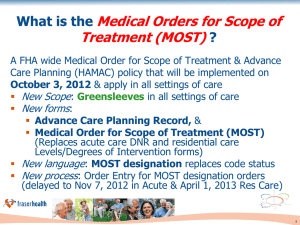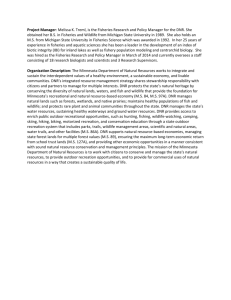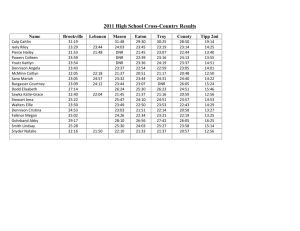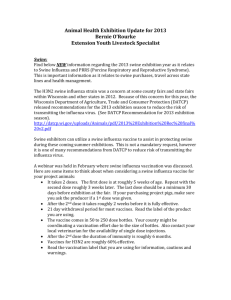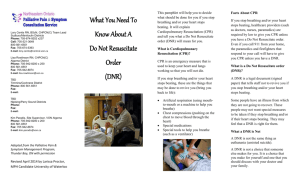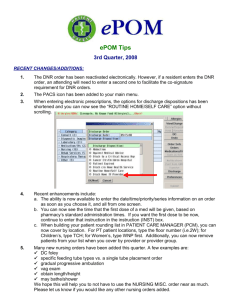Word Document - Chronic Wasting Disease Alliance
advertisement
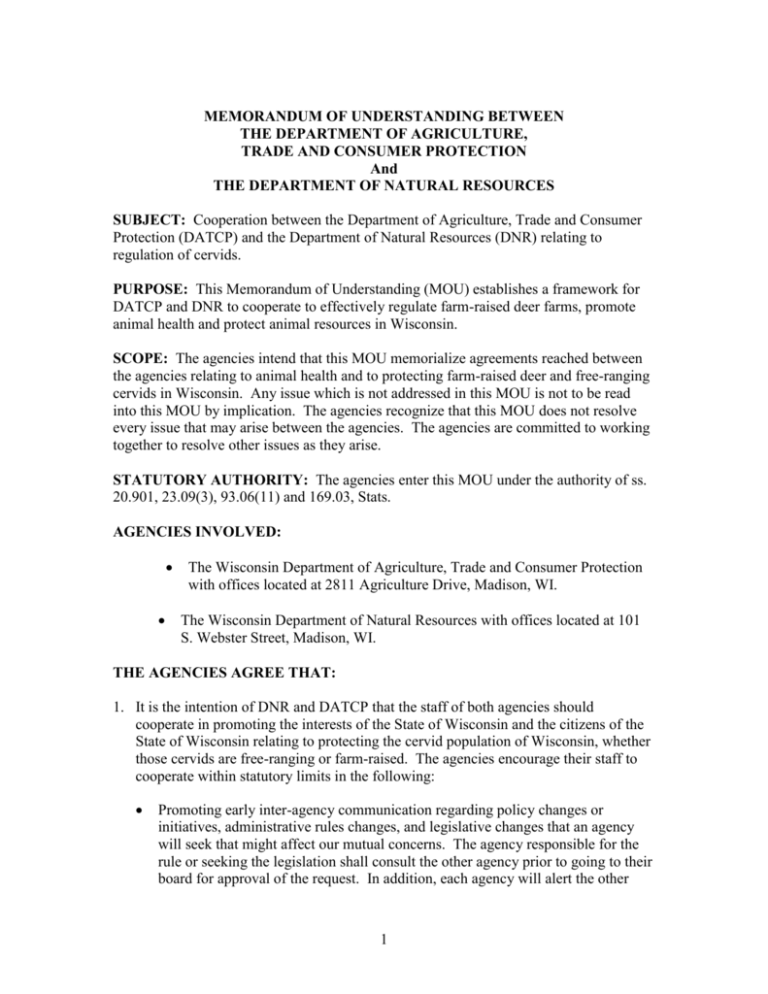
MEMORANDUM OF UNDERSTANDING BETWEEN THE DEPARTMENT OF AGRICULTURE, TRADE AND CONSUMER PROTECTION And THE DEPARTMENT OF NATURAL RESOURCES SUBJECT: Cooperation between the Department of Agriculture, Trade and Consumer Protection (DATCP) and the Department of Natural Resources (DNR) relating to regulation of cervids. PURPOSE: This Memorandum of Understanding (MOU) establishes a framework for DATCP and DNR to cooperate to effectively regulate farm-raised deer farms, promote animal health and protect animal resources in Wisconsin. SCOPE: The agencies intend that this MOU memorialize agreements reached between the agencies relating to animal health and to protecting farm-raised deer and free-ranging cervids in Wisconsin. Any issue which is not addressed in this MOU is not to be read into this MOU by implication. The agencies recognize that this MOU does not resolve every issue that may arise between the agencies. The agencies are committed to working together to resolve other issues as they arise. STATUTORY AUTHORITY: The agencies enter this MOU under the authority of ss. 20.901, 23.09(3), 93.06(11) and 169.03, Stats. AGENCIES INVOLVED: The Wisconsin Department of Agriculture, Trade and Consumer Protection with offices located at 2811 Agriculture Drive, Madison, WI. The Wisconsin Department of Natural Resources with offices located at 101 S. Webster Street, Madison, WI. THE AGENCIES AGREE THAT: 1. It is the intention of DNR and DATCP that the staff of both agencies should cooperate in promoting the interests of the State of Wisconsin and the citizens of the State of Wisconsin relating to protecting the cervid population of Wisconsin, whether those cervids are free-ranging or farm-raised. The agencies encourage their staff to cooperate within statutory limits in the following: Promoting early inter-agency communication regarding policy changes or initiatives, administrative rules changes, and legislative changes that an agency will seek that might affect our mutual concerns. The agency responsible for the rule or seeking the legislation shall consult the other agency prior to going to their board for approval of the request. In addition, each agency will alert the other 1 agency when it learns that other entities will seek statutory, administrative rule or policy changes related to farm-raised deer or free-ranging cervids. When the interests of both agencies and the constituencies of both agencies coincide, the agencies will coordinate their responses to these initiatives. Assist in law enforcement activities in ways that are compatible with the statutes, rules and procedures of the agency that has been assigned responsibility for the program. 2. The agencies agree that they will promptly share with the other agency any information they receive indicating the presence of a reportable disease being present in cervids in Wisconsin. 3. The agencies agree that, if chronic wasting disease is identified in a farm-raised deer herd or in a free-ranging cervid in an area of the state where it is not previously known to exist, the agency with responsibility for regulating the herd may seek temporary assistance from the other agency to utilize their staff or expertise without complying with the formal requirements of paragraph 6. Such assistance would be arranged by agreement of appropriate supervisors at each agency. Each agency will determine for itself what level of supervisor is the appropriate level for making these arrangements. This paragraph does not authorize either agency to assume or utilize the authority of the other agency in performing this assistance. 4. DATCP will annually provide DNR with a list of all registered farm-raised deer farms. DNR will annually provide DATCP with a list of all premises that hold a valid certificate of inspection for fences to enclose white-tail deer. 5. Each agency will have access to records relating to cervids that are maintained by the other agency. Neither agency is required to create or gather records not already kept for the benefit of the other agency. This provision does not authorize either agency to attempt to use the authority of the other agency to gain access to records kept by someone else. Wisconsin’s open records law will apply to all records shared, provided that both agencies agree to apply the exception to the open records law that is created by s. 905.09, Stats., to the extent it applies, when it receives an open records request. 6. The agencies agree that they may share staff or equipment to address specific incidents relating to cervids. If staff or equipment are shared, the agency that wants to use the staff or equipment shall be the “receiving agency.” The agency that is providing the staff or equipment shall be the “sending agency.” Each agency agrees that if it is the receiving agency, it will reimburse the sending agency for the use of its equipment or staff if the sending agency requests payment. Each agency agrees that if it seeks reimbursement it will charge the other agency at the same rate it would charge internally for the use of that equipment or staff if it charged internally for the use of equipment or staff. If an agency desires to use equipment or staff of the other agency, the following procedure will be used: 2 A. The Secretary of the receiving agency will make a written request to the Secretary of the sending agency identifying what equipment or personnel the agency seeks to use and the facts relating to the incident which creates the need for the use of the equipment or staff. B. The Secretary of the sending agency will consider the request and will provide a written response to the Secretary of the receiving agency. The written response will either authorize the requested use, deny the requested use, or offer an alternative which may serve the interests of both agencies. To the extent that the receiving agency uses the staff of the sending agency, those staff will operate solely under the supervision, management, control and authority of the receiving agency, and not under the authority of the sending agency. 7. DATCP agrees that upon discovery of CWD in a captive herd, or in a cervid that has escaped from a captive herd, it will conduct an immediate investigation that will include all the following: A. Interviews of the herd owners or operators. B. Inspection of the herd premises. C. Inspection of herd records. D. Traceback to determine other herds that may have had contact with the CWD positive animal. DATCP will conduct appropriate investigations of other herds, if it has reason to suspect contact. DATCP will consult with DNR in conducting investigations under this paragraph. DATCP may seek DNR assistance, as necessary, pursuant to par. 3 or 6. 8. If DNR needs to contact DATCP regarding cervids, DNR should contact the CWD monitoring coordinator at (608) 224-4873. If the CWD monitoring coordinator is not available, DNR may contact the chief compliance officer at (608) 224-4900. DNR agrees to have one individual who will serve as the person for others in DNR to contact with their requests for information, thereby reducing the number of people who contact DATCP to ask the same question. 9. If DATCP needs to contact DNR regarding cervids, DATCP should contact Karl Brooks. If Karl Brooks is not available, DATCP may contact Thomas Thoresen. DATCP agrees to have one individual who will serve as the person for others in DATCP to contact with their requests for information, thereby reducing the number of people who will contact DNR to ask the same question. 10. DNR will report to DATCP any violation of DATCP rules and regulations, such as unregistered deer farms, illegal movement or failure to identify farm-raised deer, that 3 DNR discovers. DATCP will determine what follow-up is appropriate, and if assistance of DNR is needed, DATCP can request assistance under paragraph 5. 11. DATCP will report to DNR any violation of DNR rules and regulations, such as fencing requirements, wild deer baiting and feeding, and any violations of statutes or rules relating to white-tail deer that occurred prior to January 1, 2003, that DATCP discovers. DNR will determine what follow-up is appropriate, and if assistance of DATCP is needed, DNR can request assistance under paragraph 5. 12. DNR will report to DATCP all complaints received for any alleged violations of farm-raised deer farm regulations occurring after January 1, 2003. DATCP will determine what follow-up is appropriate, and if assistance of DNR is needed, DATCP can request assistance under paragraph 5. 13. DATCP will promptly notify DNR when any farm-raised deer are reported to have escaped from any registered farm-raised deer farm. DNR will determine what follow-up is appropriate. 14. This agreement is effective on the latest date on which a Secretary of one of the agencies signs the agreement. This agreement may be amended or revoked at any time by written agreement of the parties. 15. Any problems or complaints regarding non-compliance with this agreement should initially be worked out or resolved at the lowest management level with responsibility in the contested area. If the matter is not resolved at the lowest management level, the discussion may be moved to the next higher management level and ultimately may be resolved at the Secretarial level. Dated this _____ day of __________, 2003. Dated this _____ day of __________, 2003. By: ________________________ Scott Hassett, Secretary Wisconsin Department of Natural Resources P.O. Box 7921 Madison, WI 53707-7921 By: __________________________ Rodney J. Nilsestuen, Secretary Wisconsin Department of Agriculture, Trade and Consumer Protection P.O. Box 8911 Madison, WI 53708-8911 4
